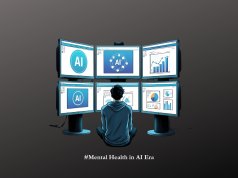In the fervent race for knowledge, where the quest for next-level breakthroughs never ceases, the research sector stands as the frontline of innovation. Yet, beneath the sheen of prestigious publications and groundbreaking studies lies a less discussed reality – the mental toll on the individuals who make these accomplishments possible. Welcome to the hidden epidemic of workplace stress and anxiety within the research sector, a crisis that mirrors yet stands apart from broader industry trends highlighted by esteemed publications like The New York Times.
The prevalence of mental health issues among researchers is not just alarming; it’s a clarion call for immediate action. With an occupational environment that demands high performance, continual funding, and prolific publishing, stress and anxiety become constant companions for many in the field. These silent stressors often remain unchecked, leading to an undercurrent of mental health struggles that can derail careers and lives.
Drawing parallels with other industries, The New York Times has shed light on the pervasiveness of workplace stress, a phenomenon cutting across fields and borders. However, researchers in New York and beyond face unique challenges intrinsic to their profession – the perpetual race for tenure, the fickleness of grant allocations, and the pressure of peer review. Each element adds a layer of complexity to their work-life balance, often tipping the scales unfavorably.
In addressing these challenges, we must look at evidence-based strategies for cultivating a more supportive work culture within research institutions. This entails open conversations about mental wellbeing, structural changes that prioritize researcher health, and the introduction of mental health days and resources. Moreover, mentoring programs and peer support groups can instill a sense of community and shared understanding that is often missing in the solitary confines of the lab.
Labor rights advocacy plays a pivotal role in spotlighting the issue of mental health in the research sector. Labor rights advocates must champion policies that protect researchers from the brunt of mental strain, advocating for work environments that are not just intellectually stimulating but also psychologically sustainable. From requiring transparency in workload expectations to enforcing anti-harassment policies, the march towards mental wellness in the research sector is as critical as the research itself.
The crisis of workplace stress and anxiety in the research sector is more than a professional hazard; it’s a systemic issue that requires a multifaceted approach. By pulling together as a community – researchers, institutions, and labor rights advocates – we can transform the research environment into one where mental health is not an afterthought but a foundational element of professional success.
In the spirit of the pioneering research that shapes our world, let’s embark on a mission to uncover and address the hidden epidemic within our ranks. Together, we can build a future where the pursuit of knowledge is not at the expense of the researcher’s wellbeing, and where the health of the mind is as valued as the intellect that drives discovery.




























